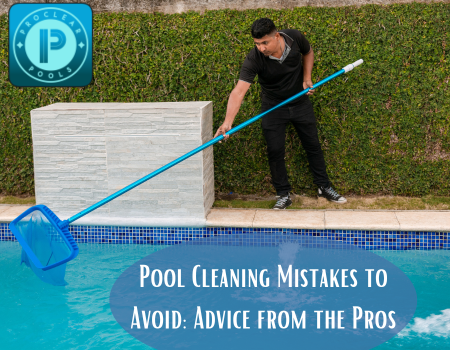Keeping your pool clean is essential for ensuring it remains a safe and enjoyable space for swimming. However, even well-intentioned pool owners can make mistakes during pool cleaning and maintenance that can lead to costly repairs, chemical imbalances, or unsafe swimming conditions. To help you avoid these pitfalls, here’s a list of common pool cleaning mistakes and expert advice on how to steer clear of them.
Common Pool Cleaning Mistakes to Avoid
-
 Ignoring Water Chemistry
Ignoring Water Chemistry
One of the biggest mistakes pool owners make is neglecting water chemistry. Balanced water is important for pool longevity and swimmer safety. Improper chemical levels can lead to:
- Cloudy water.
- Corrosion of pool surfaces and equipment.
- Algae growth.
Pro Tip: Test your pool water at least once a week using a reliable testing kit. Maintain proper levels of pH (7.2-7.8), chlorine (1-3 ppm), and alkalinity (80-120 ppm). Regular testing ensures your pool stays balanced and safe.
-
Not Cleaning the Filter Regularly
Your pool filter works tirelessly to remove dirt, debris, and contaminants from the water. A clogged or dirty filter can restrict water flow, reduce efficiency, and overwork the pump, leading to premature failure.
Pro Tip: Backwash or clean your filter as recommended by the manufacturer. Typically, this should be done every 1-2 weeks, or more often during heavy pool use.
-
Skipping Routine Brushing
Algae and debris often accumulate on pool surfaces, especially in hard-to-reach areas like corners, steps, and walls. Many pool owners neglect regular brushing, allowing buildup to persist.
Pro Tip: Brush the pool walls, floor, and steps weekly using the right type of brush for your pool’s surface. This prevents algae growth and helps keep your pool looking pristine.
-
Overlooking the Importance of Circulation
Poor circulation can result from running the pump for too few hours or having improperly positioned return jets.
Pro Tip: Run your pool pump for 8-12 hours daily, depending on pool size and usage. Position return jets to create a circular flow, ensuring water reaches all areas of the pool.
-
Using Incorrect Chemical Dosages
Adding too much or too little of pool chemicals can create significant problems. Overdosing can irritate swimmers’ skin and eyes, while underdosing can leave your pool vulnerable to bacteria and algae.
Pro Tip: Always follow the manufacturer’s instructions for chemical dosages. When in doubt, add chemicals in small increments and retest the water before adding more.
-
Failing to Address Debris Promptly
Leaves, twigs, and other debris can accumulate on the surface and bottom of your pool. Ignoring debris not only makes your pool look uninviting but can also clog the filter and increase the organic matter in the water, promoting algae growth.
Pro Tip: Skim the pool daily and vacuum weekly. Use a pool cover when the pool isn’t in use to minimize debris accumulation.
-
Neglecting Pool Equipment Maintenance
Pool equipment like pumps, filters, and heaters needs regular maintenance to function properly. Many pool owners overlook inspecting and servicing their equipment until something goes wrong.
Pro Tip: Schedule routine maintenance checks for your pool equipment and address minor issues immediately.
-
Overlooking Water Level Management
Improper water levels can affect your pool’s circulation and filtration system. Water that’s too low can cause the pump to run dry, while water that’s too high can reduce skimming efficiency.
Pro Tip: Keep the water level halfway up the skimmer opening to ensure optimal filtration and circulation.
-
Ignoring Seasonal Adjustments
Pool cleaning and maintenance requirements vary by season. Some pool owners fail to adjust their cleaning routine for changing weather conditions, leading to problems like chemical imbalances or debris buildup.
Pro Tip: Increase cleaning frequency during high-use months and after storms. During the off-season, use a pool cover and maintain basic water chemistry to avoid costly cleanups later.
-
Attempting to DIY Everything
While many pool cleaning tasks can be handled by homeowners, some issues require professional expertise. Attempting to fix complex problems, like leaks or equipment malfunctions, without proper knowledge can lead to more damage.
Pro Tip: Don’t hesitate to hire a professional for inspections, repairs, or advanced cleaning tasks. Their expertise can save you stress, money, and time in the long run.
Maintaining a clean pool requires diligence, knowledge, and the right approach. Avoiding these common pool cleaning mistakes will help you keep your pool in excellent condition, extend the life of your equipment, and ensure safe swimming conditions for your family and friends. By following these expert tips and knowing when to call in a professional, you’ll enjoy a sparkling, trouble-free pool all season long.
